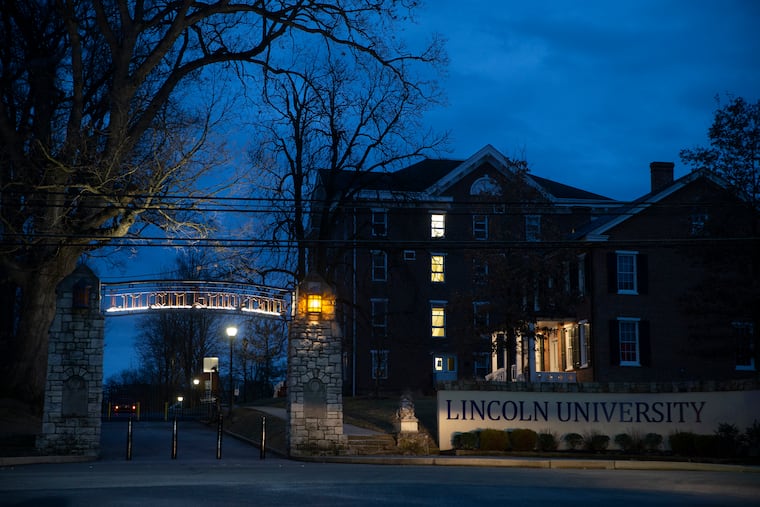After last week’s student death at Lincoln University, school leaders owe us answers | Jenice Armstrong
A student stabbed to death on campus is a tragedy. What happened to "Lincoln love"?

Last week’s homicide at Lincoln University exposed a whole host of problems at the historically Black college — ones that a former president of the parents’ association had warned about repeatedly.
Carmina Taylor complained to Lincoln’s Board of Trustees for years about rampant alcohol and drug abuse on campus, as well as the need for tighter security and more weekend extracurricular activities. So when she learned that a student was killed on Wednesday at her beloved alma mater, Taylor was not completely surprised.
“I had said, ‘If Lincoln doesn’t do something, we’re going to have a death on campus,’” recalled Taylor, who got her master’s from Lincoln in 2011 and whose son also graduated from the school.
Philadelphia resident Jawine Evans, a 21-year-old senior, was fatally stabbed during a fight inside a dormitory bearing the name of the late Supreme Court Justice Thurgood Marshall, a 1930 graduate.
» READ MORE: One student killed, two injured in stabbing at Lincoln University
A disturbing video obtained by The Inquirer shows a group of mostly males fighting violently inside a hallway as others stand nearby watching. At one point, Evans emerges from the scuffle and walks away yelling that he’d been stabbed. The video doesn’t show which assailant was wielding a knife. Two other students were wounded and treated and released from Delaware’s Christiana Hospital about 26 miles away.
“Where was the resident assistant?” Taylor asked.
“There were systems failures,” she opined. “My son lived in that dorm. I know that dorm. This is a rock-bottom moment, and this has to be the turning point for the university community.”
Sometimes institutions have to hit rock bottom before widespread, systematic changes take place.
Having an on-campus homicide inside a dormitory named after Lincoln’s most famous graduate is arguably the worst chapter in the school’s 168-year history.
I’ve heard from parents and students upset about the tragedy. The Chester County District Attorney’s Office has released few details about the incident. No arrests have been announced.
Parents send their offspring to Lincoln partly to shield them from relentless gun violence in Philadelphia, Baltimore, and Washington, D.C. They assume that school security will keep watch over their children, protecting them from outsiders intent on harm and even themselves, if necessary. Things like that aren’t supposed to happen on the school’s 429-acre campus in Chester County.
I’m an HBCU grad myself.
When my nieces attended my alma mater, Howard University, I worried about them for the whole four years they were at school. It wasn’t that I was overly concerned that something might happen to them on campus. I worried more about their safety on the streets of Washington, D.C. Inside their dormitories, surrounded by classmates and under the watchful eye of school officials, I assumed they would be safe — and thankfully they were.
I’m sure Evans’ family felt similarly when he enrolled at Lincoln, a school once known as the Black Princeton. The pain they are experiencing right now is unimaginable.
Instead of looking ahead to Evans’ graduation, they have to plan his funeral. The viewing will take place at 8 a.m. Friday at The Met, 858 N. Broad St., followed by a celebration of life at 11 a.m. Evans enjoyed playing basketball, so it’s being billed as his “final game” on a flier with the details. Interment will be at West Laurel Hill Cemetery.
The Lincoln community also is mourning alongside Evans’ family. Students held a balloon release Thursday night on campus and another one on Saturday outside Jules E. Mastbaum High School in Kensington, the neighborhood where Evans grew up. But what is the school doing to promote healing?
Parents, students, and alumni are desperate for answers to the many questions that stem from a tragedy like this. It’s incumbent upon the university’s leaders to help the Lincoln community through this grief. Now is not the time for the university to stonewall, which is what some stakeholders told me they feel may be happening. Last week’s four-sentence news release was woefully lacking in information.
Lincoln’s leaders need to hold a news conference and provide a full accounting of the incident, and it needs to happen sooner rather than later. In addition to being more forthcoming with details, the university also needs to take a hard look at its security procedures and outline what steps it will take to prevent this kind of situation from ever happening in the future. Do dormitories need additional supervision, especially now, to prevent a similar homicide from happening in the future?
One of the charms of Lincoln is that it’s a small community. Fewer than 2,000 students attend the school, which no doubt helps foster “Lincoln love,” a common mantra heard from students and alumni.
“We are very disheartened with what’s happened on campus,” said Audrey Fields, secretary of Lincoln’s Philadelphia alumni chapter. “That’s not Lincoln’s history. That’s not who we are. We are family.”
And right now, that family is hurting, and people deserve answers.